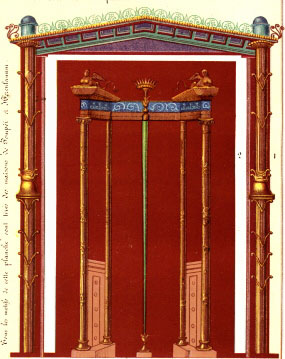Arria Marcella
A small table supported on griffin's feet and inlaid with ivory, silver, and mother-of-pearl, stood by the double bed, laden with various dishes set out on gold and silver plates or on china enameled with precious paintings. There was a pheasant Iying on a bed of feathers, and an assortment of fruits which ripen at different seasons and are rarely seen together.
Everything pointed to an awaited guest freshly cut flowers were strewn upon the ground, and the wine jugs stood in snowfilled urns.
Arria Marcella signaled to Octavian to lie down beside her on the biclinium
and to share in the meal; the young man, half mad with love and surprise,
helped himself at random from the dishes held out to him by little Asiatic
slaves with short tunics and curly hair. Arria did not eat, but frequently
raised to her lips an opalescent myrrhine goblet filled with dark purple
wine, like coagulated
blood; as she drank, a faint pinkish flush overspread her pale cheeks,
rising from the heart which had not beat for so many years. Yet when Octavian,
lifting his glass to his lips, brushed her bare arm with his hand, it was
as cold as a serpent's skin or the marble of a tomb.
"Oh! When, in the Studii, you stopped to look at the piece hardened
clay that has preserved my form," said Arria Marcella, turning her deep
moist eyes upon Octavian, "and your thought came rushing fervently toward
me, my soul felt it even in that world where I float invisible to vulgar
eyes; as belief creates the god, so love does a woman. One does not truly
die until one is no longer loved; your desire has restored me to life,
and your heart's all-powerful summons has dissolved thè distances
that divide us."
This notion of amorous evocation, expressed by the young woman, coincided with some of Octavian's philosophical beliefs—beliefs we are much inclined to share.
For indeed, nothing dies, but all exists perpetually; that which was
once, no power can annihilate. Every act, every word, every shape, every
thought which has fallen into the universal ocean of being forms  widening
circles that go on expanding to the far reaches of eternity. Their material
outline is invisible only to vulgar eyes; they send forth specters which
populate the expanses of the infinite. In some unknown region of space,
Paris is still carrying Helen away; Cleopatra's galley still spreads its
silken sails upon the azure stretches of an ideal Cydnus. Passionate
minds, powerful wills, have succeeded in summoning forth ostensibly vanished
centuries and in resurrecting human beings from the dead. Faust took Tyndareus's
daughter for his mistress and bore her away to his Gothic castle from the
mysterious depths of Hades. So Octavian, too, had lived for a day in the
reign of Titus and had been loved by Arria Marcella, Arrius Diomedes' daughter,
who at this very moment was reclining beside him upon an ancient couch,
in a city that in the eyes of the world was long since destroyed.
widening
circles that go on expanding to the far reaches of eternity. Their material
outline is invisible only to vulgar eyes; they send forth specters which
populate the expanses of the infinite. In some unknown region of space,
Paris is still carrying Helen away; Cleopatra's galley still spreads its
silken sails upon the azure stretches of an ideal Cydnus. Passionate
minds, powerful wills, have succeeded in summoning forth ostensibly vanished
centuries and in resurrecting human beings from the dead. Faust took Tyndareus's
daughter for his mistress and bore her away to his Gothic castle from the
mysterious depths of Hades. So Octavian, too, had lived for a day in the
reign of Titus and had been loved by Arria Marcella, Arrius Diomedes' daughter,
who at this very moment was reclining beside him upon an ancient couch,
in a city that in the eyes of the world was long since destroyed.